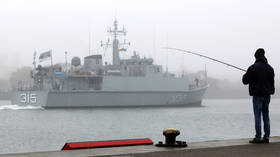NATO states mull closing Baltic for Russian Navy

Tallinn and Helsinki have discussed the integration of coastal missile batteries that would enable the two Western states to blockade the Russian Navy in the Gulf of Finland, Estonia’s defense minister announced on Friday.
This would turn the Baltic Sea into a “NATO internal sea,” the official said, echoing comments made earlier by Polish and Lithuanian leaders.
Finland has applied to join the US-led military bloc.
“We need to integrate our coastal defenses. The flight range of Estonian and Finnish missiles is greater than the width of the Gulf of Finland,” Estonian Defense Minister Hanno Pevkur told the Finnish newspaper Iltalehti.
Finland’s MTO85M coastal missiles have a range of over 100 kilometers. The Gulf is about 82 kilometers across from Helsinki to Tallinn. Estonia plans to buy Israeli Blue Spear missiles later this year, which have a range of almost 300 kilometers.
“The Baltic Sea will be NATO’s internal sea when Finland and Sweden have joined NATO. Compared with what it is today, the situation is changing,” Pevkur said, adding that the two countries will then be able to close the sea to the Russian Navy if need be.
The applications of Finland and Sweden to join NATO were met with the greatest enthusiasm by Poland and the former Soviet republics on the Baltic Sea. Following the alliance’s summit in Spain at the end of June, Polish President Andrzej Duda and Latvian Foreign Minister Edgars Rinkevics both said they hoped for the Baltic to become a “NATO lake.”
Pevkur said he discussed airspace with his Finnish colleague as well, though he dodged Iltalehti’s question whether the US will deploy its F-35 fighter jets to Estonia.
“For me, this is one airspace,” Pevkur added. “Finnish airspace cannot be protected if Estonian airspace is not protected at the same time, and vice versa. Fighter jets cross the 80-kilometer-wide Gulf of Finland in minutes.”
Estonia has been one of the most outspoken NATO members in urging a confrontation with Russia. On Thursday, Tallinn announced that it would ban entry to Russians with EU Schengen visas starting next week, and demolish all Soviet-era monuments “as soon as possible.”













